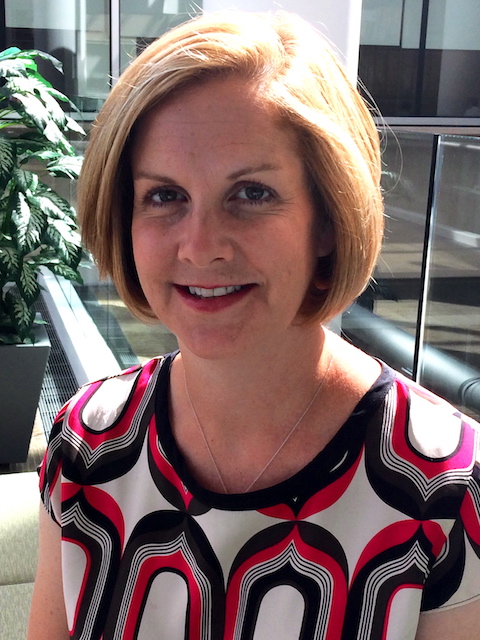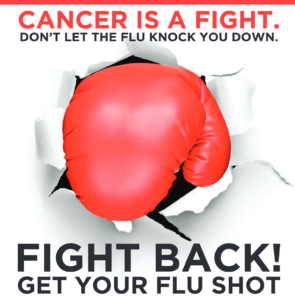Fall is here again and that means the flu vaccine is back! You’re likely to see signs for it in the supermarket and the pharmacy. Take heed of these reminders and get your shot. Many people with cancer (and survivors) may be wondering how they can best prevent getting sick, and if they should be vaccinated against the flu. Here are the facts…
People with cancer, and those who had cancer in the past, are at a higher risk of developing complications if they get the flu. This makes it extra important for you to do what you can to prevent getting the flu. The best way to prevent getting the flu is to get a flu shot each year. Your caregivers and family members should also get the shot to help prevent you from being exposed to the flu.
Get the facts about the flu!
- People with the flu can spread it to others up to 6 feet away!
- The flu is spread through droplets made when sick people cough or sneeze. People nearby can inhale these, or get them on their hands, which then touch their own nose or mouth, letting the virus in their body.
- A person with the flu can infect someone else the day BEFORE they develop symptoms and for up to a week after becoming sick.
What should people with cancer and their caregivers know about the flu vaccine?
- If you are undergoing cancer treatment, talk with your care team about the best time to get the vaccine. It works best when you are the least immunocompromised. This means that you should not receive the vaccine during your nadir (the time when blood counts are at their lowest, typically 7-14 days after treatment).
- The flu vaccine causes antibodies to develop in the body about 2 weeks after getting the vaccine.
- There are a few types of flu shots available. People with cancer should get one of the seasonal flu shots which protect against the 3 (called trivalent vaccine) or 4 (called quadrivalent vaccine) most common flu strains.
- People with cancer should only get the vaccine given in a shot. The nasal spray vaccine is made with live viruses (though weakened) and this may put someone with cancer at risk for getting sick from these viruses.
- People who are over 65 years of age can receive a high-dose flu vaccine to help them have a better immune response.
- In addition, the people you live with should also be vaccinated to lower their risk of getting the flu – and therefore the risk of them exposing you. In some cases they can receive the nasal (live) vaccine, though if you are receiving active treatment, the shot is safest to decrease your risk of exposure.
- People with cancer (particularly those on therapy or post-transplant) should also talk with their care team about getting a pneumovax vaccine. This vaccine helps to prevent a common strain of bacteria that can cause pneumonia as well as other serious infections.
What precautions should you take as a patient receiving cancer therapy?
Remember, while receiving cancer treatment, you are at an increased risk of getting infections, including colds and the flu, particularly when your blood counts are low.
- Most importantly, wash your hands often- it is the easiest, most effective way to prevent the spread of infection.
- Keep hand sanitizer in your bag, desk, car or anywhere you may not be able to access a sink for handwashing.
- Avoid touching your eyes, nose and mouth- that is how germs get in. It is perfectly acceptable not to shake hands or to ask people who are sick (or have sick people in their household) not to visit you.
- Ask any visitors to wash their hands upon arrival and, whenever possible, avoid places with crowds of people, particularly when your blood counts are at their lowest.
- Have other members of your household get vaccinated as well; you don’t want them bringing these infections into your house where it will be harder to avoid.
Still, even the best handwashers get sick sometimes, so don’t blame yourself if you do. Get plenty of rest, drink plenty of fluids, and help to prevent the spread of the flu to others by staying home when you are sick.
You can learn a lot more about the flu vaccine for people with cancer through the CDC website.
Now roll up your sleeve – this won’t hurt a bit!
**Are you a healthcare provider? The CDC has a great poster for your clinic!

Carolyn Vachani is an oncology advanced practice nurse and the Managing Editor at OncoLink. She has worked in many areas of oncology including BMT, clinical research, radiation therapy and staff development. She serves as the project leader in the development and maintenance of the OncoLife Survivorship Care Plan and has a strong interest in oncology survivorship care. She enjoys discussing just about any cancer topic, as well as gardening, cooking and, of course, her sons.
